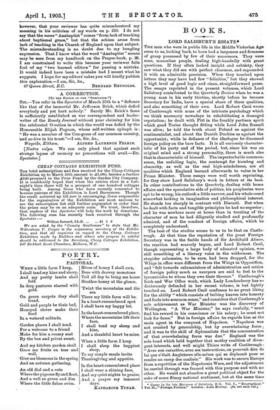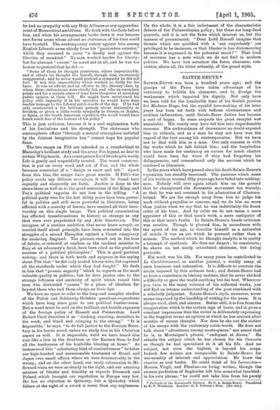THE men who were in public life in the Middle
Victorian Age seem to us, looking back, to have had a largeness and firmness
of grasp possessed by few of their successors. They were sane, masculine people, dealing high-handedly with great questions. If they often lacked insight and subtlety, they saw what they did see with perfect clearness, and expounded it with an admirable precision. When they touched upon letters they may have had few "felicities," but they showed a high level of good logic and clean, straightforward prose.
The essays reprinted in the present volumes, which Lord Salisbury contributed to the Quarterly Review when he was a young man in his early thirties, shortly before he became Secretary for India, have a special share of these qualities, and also something of their own. Lord Robert Cecil wrote of Castlereagh with none of the intricate psychology which we think necessary nowadays in rehabilitating a damaged reputation; he dealt with Pitt in the frankly partisan spirit which good Tories thought fitting while Lord John Russell was alive; he told the truth about Poland as against the sentimentalist, and about the Danish Duchies as against the opportunist ; while in defiance of the ideologue he dismissed foreign policy on the bare facts. It is all curiously character- istic of his party and of the period, but, since his was an original mind and a strong personality, there is much also that is characteristic of himself. The imperturbable common- sense, the unfailing logic, the contempt for humbug and obscurity, as well as the real high-mindedness, are all qualities which England learned afterwards to value in her Prime Minister. These essays were well worth reprinting, for they show Lord Salisbury's work in letters at its best, In other contributions to the Quarterly, dealing with home affairs and the speculative side of politics, his prophecies were apt to be wrong, his outlook a little narrow, and his whole creed somewhat lacking in imagination and philosophical interest.
He stands too sharply in contrast with Disraeli. But when he dealt with facts and tangible principles he had no superior ; and he was nowhere more at home than in treating of the character of men he had diligently studied and profoundly admired, and of the conduct of foreign affairs, which he completely understood.
The best of the studies seems to us to be that on Castle- reagh. At that time the reputation of the great Foreign Secretary was in the feeble bands of Sir Archibald Alison, the reaction had scarcely begun, and Lord Robert Cecil, though representing a large body of educated opinion, was still something of a literary voice in the wilderness. The stupider calumnies, to be sure, had been dropped, for tho Whigs in office were different from the Whigs in Opposition, and "felt towards calumniators of administration and critics of foreign policy much as usurpers are said to feel to the tyramiicides to whom they owe their thrones." Castlereagh's Irish and War Office work, which Lady Londonderry has so dexterously defended in her recent volume, is but lightly touched on. Lord Robert Cecil confesses to no great liking for the ability "which consists of bribing knaves into honesty and fools into aommon-sense," and considers that Castlereagh's sole achievement as War Minister was the discovery of Wellington. "A War Minister," he says ruefully, "must find his reward in his conscience or his salary ; he must not look for fame." But in foreign affairs he regards him as the main agent in the conquest of Napoleon. "Napoleon was not crushed by generalship, but by overwhelming force ; and it was to the skill of diplomatists that the concentration of that overwhelming force was due." England was the sole bond which held together that motley coalition of diver- gent interests, and well might Thiers write of Castlereagh : " Avec son caractere, avec ses instructions, on pourrait dire de lui que c'etait Angleterre elle-meme qui se deplacait pour se rendre au camp des coolish." His work was to secure Europe from a repetition of the Napoleonic Wars, and the adjustment be carried through was framed with this purpose and with no other. He would not abandon a great political object for the sake of some flimsy national sentiment, but at the same time
• Essays by the late Marquess of Salisbury, KG. Vol. 1., "Biograplitzal."
VoL "Foreign Politics." London: John Murray. [43e. net eacL eel.]
ment of Monarchical ambitions. He dealt with the facts before him, and when his arrangements broke down it was because new forces arose whose advent no statesman of his time could have foretold. The contemporary outcry against him among English Liberals arose chiefly from his "passionless exterior," which they assumed to cover "a deadly zeal against the liberties of mankind." No man worked harder for liberty ; but for abstract " causes " he cared not at all, and he was too honest to pretend that he did :—
" Some of them be thought pernicious, others impracticable, and of others he thought the benefit, though real, enormously exaggerated; and he never would pretend a sympathy he did not feel. It was this impassibility which worked so badly for his fame. It was an affront and an offence to th5 literary class, by whom these enthusiasms were chiefly fed, and who on secondary points and for a certain space of time have the power of moulding public opinion at their will. He might have maintained his policy with impunity if in his speeches he would have done readier homage to the Liberal catch-words of the day. If he had only constructed a few brilliant periods about nationality or freedom, or given a little wordy sympathy to Greece, or Naples, or Spain, or tho South American republics, the world would have heard much less of the horrors of his policy."
This is just criticism, because it is a real explanation both of his limitations and his strength. The statesman who contemplates affairs "through a mental atmosphere untinted by the faintest imaginative hue" cannot hope for popular fame.
The two essays on Pitt are intended as a counterblast to
Macaulay's brilliant study and the great Fox legend, so dear to certain Whig hearts. As a consequence Lord Stanhope's wordy Life is gently and respectfully treated. The worst construc- tion is put on every word and act of Fox, and the whole becomes somewhat of a "design in snow and ink." Apart from this bias, the essays have great merits. If Pitt's war policy needs any defence nowadays, it will be found here cogently and eloquently set forth. Justice is done to the shrewdness as well as to the good intentions of the King, and Fox's political vagaries do not lose in the telling. "A political party who for the last thirty years have been power- ful in politics and still more powerful in literature, being afflicted with a scarcity of heroes, have centred all their hero- worship on this single image. This political canonisation has effected transformations in history as strange as any that were ever perpetrated by any Acta Sanctorum. The intrigues of a restless ambition, that never knew scruple, or worried itself about principle, have been converted into the struggles of a second Hampden against a Court conspiracy for enslaving England. The phrases struck out in the heat of debate, or selected at random as the readiest missiles to fling at an adversary's head, have been cited as the profound maxims of a political philosopher." This is good partisan writing; and there is both truth and epigram in the saying about Pitt that "he riot only routed his enemies, but captured all the standards under which they had fought." He finds in him that "prosaic sagacity" which he regards as the most valuable quality in politics; but he does justice also to the strange loftiness and austerity of spirit which raised this man who distrusted " causes " to a plane of idealism far beyond those who had them always on their lips.
We have no space to refer to the long and complex studies of the Polish and Schleswig-Holstein questions,—questions which have long since gone to our political lumber-room. But a word must be said on the brilliant and hostile exposure
of the foreign policy of Russell and Palmerston. Lord Robert Cecil describes it as "dashing, exacting, dauntless to the weak, and timid and cringing to the strong." "It is impossible," he says, "to do full justice to the Foreign Secre- tary in his heroic mood, unless we study him in his Christian aspect as well. It is impossible, until we have heard him roar like a lion in the Southern or the Eastern Seas, to feel all the tenderness of his lamb-like bleating at home." As instances of this "calculating kind of combativeness" he takes our high-handed and unreasonable treatment of Brazil and Japan over small affairs where we were demonstrably in the wrong; and on the other hand, our ready submission to Mr. Seward when we were as clearly in the right, and our amazing mixture of bluster and timidity as regards Denmark and Poland, which brought our reputation in Europe very low, He has no objection to Quixotry, but a Quixotry which falters at the sight of a sword is worse than any supineness.
On the whole, it is a fair indictment of the characteristic defects of the Palmerstonian pollcy ; but these are long-dead quarrels, and it is not the facts which interest us, but the manner of presentment. "Does Lad Russell imagine that threats which are qualified with a not improbably' are privileged to be insincere, or that bluster is less dishonouring because it is expressed in the potential mood P" That kind of sentence has a note which we do not find in modern politics. We have lost somehow the force, clearness, con- viction, above all, the bitter urbanity, of the grand style.







































 Previous page
Previous page